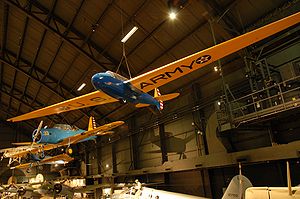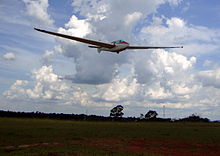Laister-Kauffman LK-10
| Laister-Kauffman TG-4 | |
|---|---|
 TG-4A in the National Museum of the United States Air Force |
|
| Type: | Glider |
| Design country: | |
| Manufacturer: | |
| First flight: |
1941 |
| Commissioning: |
1942 |
| Production time: |
1941 to 1943 |
| Number of pieces: |
156 |
The Laister-Kauffman TG-4 (also known as the Laister-Kauffman LK-10 ) was an American military glider manufactured in the 1940s .
history
During the Second World War, the USAAF (United States Army Air Forces) needed a significant number of glider pilots for their gliders to transport troops. Jack Laister developed the aircraft in 1941 in response to a request from the United States Army. It was based on his design of a single-seat gull wing glider that Jack Laister designed in 1938 while studying at Lawrence Technological University . The prototype took part in an aerobatic competition at the Paris Air Show in 1939 .
The USAAF had expressed interest, but Laister himself could not finance the required prototypes on his own. After finding a sponsor, he founded the Laister-Kauffman Corporation in St. Louis , Missouri with businessman John Kauffman . USAAF ordered three prototypes, which were designated as the XTG-4. After evaluating the test flights, the army placed a first order for 75 aircraft, followed by a second order for another 75 units. Laister-Kauffmann delivered the first XTG-4 prototypes at the end of December 1941 and the first production aircraft in July 1942. The last of the 150 TG-4A was delivered in June 1943. A comparable German type is the DFS Kranich .
During the Second World War, the USAAF discontinued its use because it turned out that the flight characteristics of the aircraft were too different from the requirements for a cargo glider. The experiences on the TG-4A were not particularly relevant for further training. Another order for the TG-4B series was withdrawn by USAAF.
construction
The TG-4A wings of the middle decker were made of mahogany plywood in rib construction, which were planked with plywood around the profile nose and covered with a lacquered fabric covering. The fuselage was made of welded chrome-molybdenum steel tubing, which was also covered with aircraft silk. The chassis had an unsprung wheel with a disc brake. In addition, there were wooden runners on the aircraft nose, on the two wing ends and a tail spur under the horizontal stabilizer. The wing profile corresponded to the type NACA 4418 . The standard instruments of the TG-4 were a magnetic compass , altimeter , airspeed indicator , variometer , spherical vial and an SCR-585-B radio, with sockets for two headphones and a throat microphone for the pilot and flight instructor.
variants
- XTG-4, prototype (3 built)
- TG-4A, military model (150 built)
- TG-4B (1 built)
Technical specifications
| Parameter | Data LK-10 / TG-4A |
|---|---|
| crew | 2 (pilot and flight instructor) |
| length | 6.5 m |
| span | 15.24 m |
| height | 1,115 m above the cockpit |
| Wing area | 15.2 m² |
| Wing extension | |
| Glide ratio | 22 at 80 km / h |
| Slightest sinking | 0.97 m / s at 73 km / h |
| payload | |
| Empty mass | 216 kg |
| Max. Takeoff mass | 397 kg |
| Minimum speed | 61 km / h |
| Top speed | 225 km / h |
| Maximum speed winch launch | 130 km / h |
| Top speed F-tow | 203 km / h |
| Load factor | + 6 / −3 at 225 km / h |
Whereabouts
Numerous TG-4A were sold and passed into the possession of private glider pilots, they were even sold abroad and were used in the school operations of flying clubs. The civil version then had the designation LK-10. An LK-10 with serial number 106 was in operation under the prefix PT-PAZ at the “Aeroclube de Bauru” in Brazil until April 2013.
Exhibits
LK-10 / TG-4A are exhibited in the following museums:
- Air Mobility Command Museum
- Museum of Aviation . The TG-4A on display with serial number 42-43740 was stationed with the Army Air Corps 1148, a glider training squadron, at Fort Sumner , New Mexico , and was in service until September 1944. The TG-4 has been in the museum since 1987.
- National Museum of the United States Air Force
- Planes of Fame
- Silent Wings Museum
- US Southwest Soaring Museum
Web links
- National Museum of the United States Air Force fact sheet
- Sailplane Directory entry on the LK-10
- Lawrence Technological University timeline
Individual evidence
- ↑ Homepage Aeroclube de Bauru
- ↑ TG-4A ( memento of January 21, 2015 in the Internet Archive ) on museumofaviation.org
